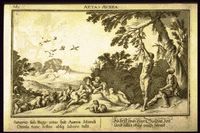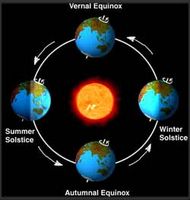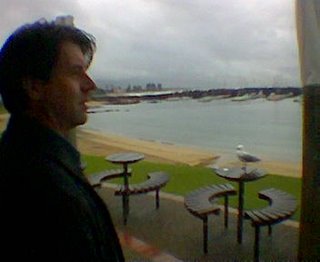Winter Solstice
St Thomas grey, St Thomas grey,
The longest night and the shortest day.
Traditional English rhyme.
St Thomas's feast day is now July 3 , formerly December 21
Today is the shortest day of the year if you're downunder and the longest one if you're up top. So I suppose if you were taking a religious view of things, we should be celebrating Christmas down here as a throwback to "pagan", Ogham, Egyptian Ancient Greek and other assorted hunter-gatherer celebrations as the days got longer. (This website gives an account of a Greek Festival Lenaea)
The winter solstice ritual was called Lenaea, the Festival of the Wild Women. In very ancient times, a man representing the harvest god Dionysos was torn to pieces and eaten by a gang of women on this day. Later in the ritual, Dionysos would be reborn as a baby. By classical times, the human sacrifice had been replaced by the killing of a goat. The women's role had changed to that of funeral mourners and observers of the birth
Sounds pretty violent! It sounds more of parable which was regarded as "truth" in later times, describing the active priciple (the male/sun) being devoured by the passive priciple (the female/moon) then re-emerging.
So if you are of the following faiths here's what your people do, which in the main has been "borrowed" from less organized spiritual festivals.......note the constant light emerging from the darkness themes.
Buddhists are one step ahead and have celebrated Buddha's enlightenment under a tree on December the 8th, this would make it around May the 31st downunder.
Judaism: Celebrate the start of Hannukah (which to me always sounds Hawaiian for some reason) celebrates the taking back of the lamp from a Syrian king, again a parable based on the return of the light or the sun. They light eight candles over eight days starting with the day of winter solstice. Whether they celebrate Hannukah in June or december down under I don't know.
Druids: Apparently they see the Sun-God as travelling through the underworld.... on the shortest day of the year.
Islam: Recognises the word of Allah via the Qura'n to the people. It starts on the first sighting of the crescent moon, ie when the moon is on the first day past it's darkest state.
Christianity: Celebrates the birth of Yeshua of Nazareth.(three kings guided by a light at might to the stable) No-one knows when he was born so to fit this in the pagan festivals, Roman powers-that- be replaced the festival of Saturnalia with this one.

Being the fragmented divided unit the Christian faith is,
The Lutherans, Dutch Reformed, Catholic and Anglican churches forged ahead with the celebrations while the Baptists, Presbyterians, Quakers and Puritans continued to rail against it. Even today, some Christian groups, including many Churches of Christ and Seventh-day Adventists, do not acknowledge Christmas as a religious observance.
Winter Solstice was at one time the day of St Thomas of "doubting Thomas" fame, the analogy I suppose is that St Thomas was in the dark until he saw the light:-)
Hindus: Celebrate MAKAR SANKRANTIwhich due to the particularly complicated and typically Indian intracies of the Vedic calendar, has a variety of opinions which Indian date it falls on.
Makara Sakranti is the winter solstice in the Hindu solar calendar. It is marked by the passing of the sun into the sign (Sakranti, Samkranti) of Makara (Capricorn). There are festivals on the day itself and on the eve to celebrate the coming of spring.
Unfortunately, there are several ways of calculating the Hindu solar calendar, so its date may vary by up to one day in various parts of India depending whether local custom dictates the use of the old or new Hindu calendar or astronomical tables. This is further confused by the fact that the date reported as a holiday is sometimes the 1st of Makara and sometimes the eve. It always occurs around the 14th or 15th of January. Lohri, in Punjab and Harayana, commonly occurs one day earlier on the 13th or 14th
Back to things around my location and less spiritual and little more commercial.Later in the year around July, there will be Christmas in July or Yulefest further up the mountains around Katoomba and Blackheath where it sometimes snows. It's a good chance for some of the hotels and restaraunts around here to make some money during a usually pretty cold, windy, freezing, miserable time of the year.
A small group of Irish visitors had come to The Blue Mountains to enjoy the clear winter climate that they were accustomed to back in Ireland - they commented that "Celebrating Christmas in Australia during the heat of summer just didn't feel quite the same".
The host and owner of the Mountain Heritage offered to re-create for his Irish guests, a festive 'Winter Christmas' atmosphere with all the trimmings - frosted windows, Christmas feasts of turkey, hams, mince pies and steaming plum puddings, and choiristers joining together singing the joys of the festive season. Plus, of course, a snowman.
The idea has caught on, "Christmas in July" now takes place from Fremantle on the west coast, to the tropics in Queensland(in Aussie laconic style " to the Alpine regions of the Snowy Mountains.
Anyway....... I'm not particularly religious..... spiritual perhaps, so I'll most likely take up the feast aspect of ancient Roman times, enjoy the long night, get myself one of those big juicy hamburgers, that drip down your arms from the takeaway up the street, maybe a couple of glasses of red as well. Followed by a good book on the couch.




0 Comments:
Post a Comment
<< Home